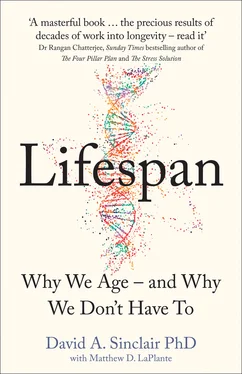Indeed, among an increasing number of cancer researchers, optimism abounds. And that hopefulness was at the heart of what was arguably the most memorable part of President Barack Obama’s final State of the Union address in 2016.
“For the loved ones we’ve all lost, for the family we can still save, let’s make America the country that cures cancer once and for all,” Obama said as he stood in the House of Representatives chamber and called for a “cancer moon shot.” When he placed then Vice President Joe Biden—whose son Beau had died of brain cancer a year earlier—in charge of the effort, even some of the Democrats’ staunch political enemies had trouble holding back the tears.
In the days and weeks that followed, many cancer experts noted that it would take far more than the year remaining to the Obama-Biden administration to end cancer. Very few of those experts, however, said it absolutely couldn’t be done. And that’s because, in the span of just a few decades, we had completely changed the way we think about cancer. We no longer submit ourselves to its inevitability as part of the human condition.
One of the most promising breakthroughs in the past decade has been immune checkpoint therapy, or simply “immunotherapy.” Immune T-cells continually patrol our body, looking for rogue cells to identify and kill before they can multiply into a tumor. If it weren’t for T-cells, we’d all develop cancer in our twenties. But rogue cancer cells evolve ways to fool cancer-detecting T-cells so they can go on happily multiplying. The latest and most effective immunotherapies bind to proteins on the cancer cells’ surface. It is the equivalent of taking the invisible cloak off cancer cells so T-cells can recognize and kill them. Although fewer than 10 percent of all cancer patients currently benefit from immunotherapy, that number should increase thanks to the hundreds of trials currently in progress.
We continue to rail against a disease we once accepted as fate, pouring billions of dollars into research each year, and the effort is paying off. Survival rates for once lethal cancers are increasing dramatically. Thanks to a combination of a BRAF inhibitor and immunotherapy, survival of melanoma brain metastases, one of the deadliest types of cancer, has increased by 91 percent since 2011. Between 1991 and 2016, overall deaths from cancer in the United States declined by 27 percent and continue to fall. 3That’s a victory measured in millions of lives.
Aging research today is at a similar stage as cancer research was in the 1960s. We have a robust understanding of what aging looks like and what it does to us and an emerging agreement about what causes it and what keeps it at bay. From the looks of it, aging is not going to be that hard to treat, far easier than curing cancer.
Up until the second half of the twentieth century, it was generally accepted that organisms grow old and die “for the good of the species”—an idea that dates back to Aristotle, if not further. This idea feels quite intuitive. It is the explanation proffered by most people at parties. 4But it is dead wrong. We do not die to make way for the next generation.
In the 1950s, the concept of “group selection” in evolution was going out of style, prompting three evolutionary biologists, J. B. S. Haldane, Peter B. Medawar, and George C. Williams, to propose some important ideas about why we age. When it comes to longevity, they agreed, individuals look out for themselves. Driven by their selfish genes, they press on and try to breed for as long and as fast as they can, so long as it doesn’t kill them. (In some cases, however, they press on too much, as my great-grandfather Miklós Vitéz, a Hungarian screenwriter, proved to his bride forty-five years his junior on their wedding night.)
If our genes don’t ever want to die, why don’t we live forever? The trio of biologists argued that we experience aging because the forces of natural selection required to build a robust body may be strong when we are 18 but decline rapidly once we hit 40 because by then we’ve likely replicated our selfish genes in sufficient measure to ensure their survival. Eventually, the forces of natural selection hit zero. The genes get to move on. We don’t.
Medawar, who had a penchant for verbiage, expounded on a nuanced theory called “antagonistic pleiotropy.” Put simply, it says genes that help us reproduce when we are young don’t just become less helpful as we age, they can actually come back to bite us when we are old.
Twenty years later, Thomas Kirkwood at Newcastle University framed the question of why we age in terms of an organism’s available resources. Known as the “Disposable Soma Hypothesis,” it is based on the fact that there are always limited resources available to species—energy, nutrients, water. They therefore evolve to a point that lies somewhere between two very different lifestyles: breed fast and die young, or breed slowly and maintain your soma , or body. Kirkwood reasoned that organisms can’t breed fast and maintain a robust, healthy body—there simply isn’t enough energy to do both. Stated another way, in the history of life, any line of creature with a mutation that caused it to live fast and attempt to die old soon ran out of resources and was thus deleted from the gene pool.
Kirkwood’s theory is best illustrated by fictitious but potentially real-life examples. Imagine you are a small rodent that is likely to be picked off by a bird of prey. Because of this, you’ll need to pass down your genetic material quickly, as did your parents and their parents before them. Gene combinations that would have provided a longer-lasting body were not enriched in your species because your ancestors likely didn’t escape predation for long (and you won’t, either).
Now consider instead that you are a bird of prey at the top of the food chain. Because of this, your genes—well, actually, your ancestors’ genes—benefited from building a robust, longer-lasting body that could breed for decades. But in return, they could afford to raise only a couple of fledglings a year.
Kirkwood’s hypothesis explains why a mouse lives 3 years while some birds can live to 100. 5It also quite elegantly explains why the American chameleon lizard, Anolis carolinensis , is evolving a longer lifespan as we speak, having found itself a few decades ago on remote Japanese islands without predators. 6
These theories fit with observations and are generally accepted. Individuals don’t live forever because natural selection doesn’t select for immortality in a world where an existing body plan works perfectly well to pass along a body’s selfish genes. And because all species are resource limited, they have evolved to allocate the available energy either to reproduction or to longevity, but not to both. That was as true for M. superstes as it was and still is for all species that have ever lived on this planet.
All, that is, except one: Homo sapiens .
Having capitalized on its relatively large brain and a thriving civilization to overcome the unfortunate hand that evolution dealt it—weak limbs, sensitivity to cold, poor sense of smell, and eyes that see well only in daylight and in the visible spectrum—this highly unusual species continues to innovate. It has already provided itself with an abundance of food, nutrients, and water while reducing deaths from predation, exposure, infectious diseases, and warfare. These were all once limits to its evolving a longer lifespan. With them removed, a few million years of evolution might double its lifespan, bringing it closer to the lifespans of some other species at the top of their game. But it won’t have to wait that long, nowhere near that. Because this species is diligently working to invent medicines and technologies to give it the robustness of a much longer lived one, literally overcoming what evolution failed to provide.
Читать дальше












